 EDITOR'S PICK
EDITOR'S PICK
Is a Used EV the Best First Car for Teens?
02 Sep 2025 | Synopsis
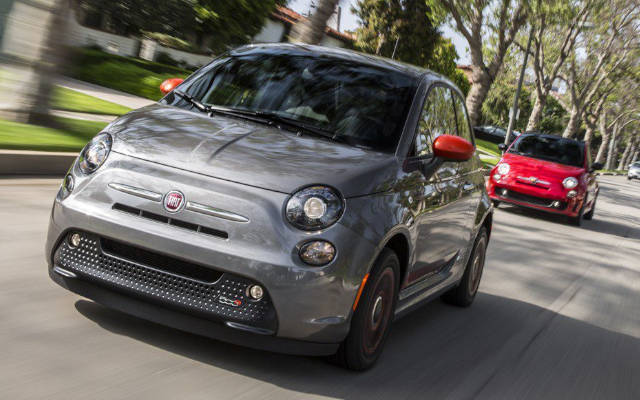 The article recommends used EVs like the Nissan Leaf, Chevy Bolt, and Fiat 500e as smart first cars for teens due to low prices (often under $10K), safety tech, and limited range that keeps teens close to home. These models are widely available, easy to maintain, and offer features like app-based tracking. Overall, they're practical, budget-friendly choices for new drivers, but also check with your insurer since EVs can have higher premiums.
The article recommends used EVs like the Nissan Leaf, Chevy Bolt, and Fiat 500e as smart first cars for teens due to low prices (often under $10K), safety tech, and limited range that keeps teens close to home. These models are widely available, easy to maintain, and offer features like app-based tracking. Overall, they're practical, budget-friendly choices for new drivers, but also check with your insurer since EVs can have higher premiums.Hydrogen Sets Sail for Zero-Emission Shipping in the Netherlands
01 Sep 2025 | Synopsis
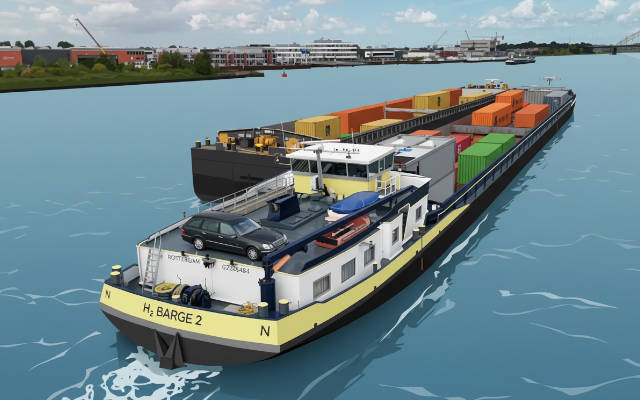 Hydrogen-powered inland vessels have begun operating in the Netherlands, notably the H2 Barge 2 retrofitted with fuel-cell and electric propulsion. Operating between Rotterdam and inland terminals, it completes ~100 round trips yearly, cutting about 2,000 tonnes of CO₂ per year. Funded under the EU's Zero Emission Ports North Sea (ZEM Ports) project, the initiative highlights hydrogen's promise for clean maritime transport - but widespread adoption still faces cost and incentive obstacles.
Hydrogen-powered inland vessels have begun operating in the Netherlands, notably the H2 Barge 2 retrofitted with fuel-cell and electric propulsion. Operating between Rotterdam and inland terminals, it completes ~100 round trips yearly, cutting about 2,000 tonnes of CO₂ per year. Funded under the EU's Zero Emission Ports North Sea (ZEM Ports) project, the initiative highlights hydrogen's promise for clean maritime transport - but widespread adoption still faces cost and incentive obstacles.India is Building a Strong EV Ecosystem While the World Only Sees Tesla & BYD
01 Sep 2025 | Synopsis
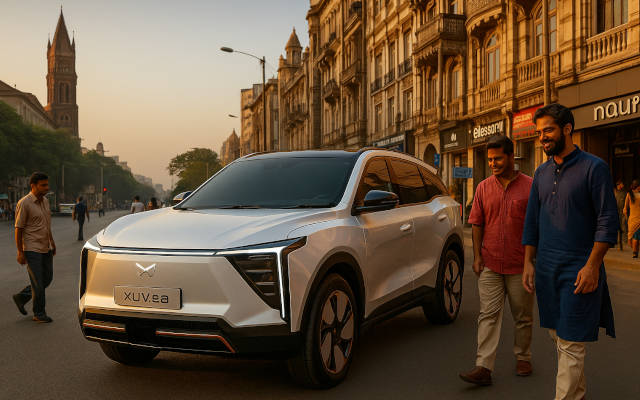 India's EV sector is rapidly evolving beyond headline makers like Tesla and BYD, developing a homegrown ecosystem. Local startups and incumbents are advancing battery tech, charging networks, and deep-tech innovation. Government support -including FAME II, PLI schemes, and customs exemptions - is boosting domestic manufacturing, startups, and infrastructure. While global attention lingers on foreign brands, India's EV ecosystem is quietly maturing with scale and resilience.
India's EV sector is rapidly evolving beyond headline makers like Tesla and BYD, developing a homegrown ecosystem. Local startups and incumbents are advancing battery tech, charging networks, and deep-tech innovation. Government support -including FAME II, PLI schemes, and customs exemptions - is boosting domestic manufacturing, startups, and infrastructure. While global attention lingers on foreign brands, India's EV ecosystem is quietly maturing with scale and resilience.The Coming Ecological Cold War
01 Sep 2025 | Synopsis
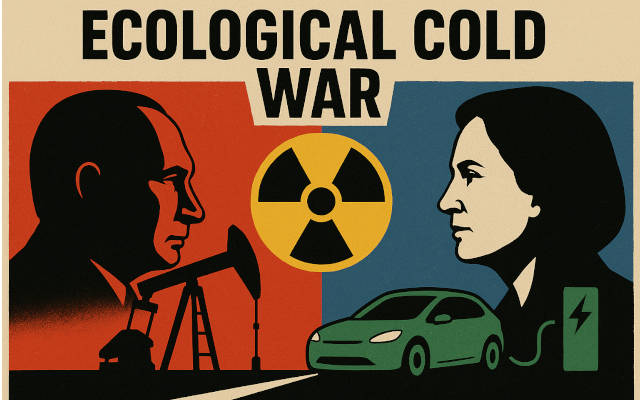 The energy transition is more than tech or economics—it’s reshaping geopolitics. IEA's "Net Zero by 2050" imposes an all-out electrification, doubling electricity, zero-carbon, renewables, EV share leaps, industrial & building overhaul by 2050. This sparks an eco-ideological Cold War: a Sino-European green entente vs an axis of petrostates (U.S., Russia, Saudi Arabia) resisting decarbonization
The energy transition is more than tech or economics—it’s reshaping geopolitics. IEA's "Net Zero by 2050" imposes an all-out electrification, doubling electricity, zero-carbon, renewables, EV share leaps, industrial & building overhaul by 2050. This sparks an eco-ideological Cold War: a Sino-European green entente vs an axis of petrostates (U.S., Russia, Saudi Arabia) resisting decarbonizationThe Dutch Blueprint: Infrastructure Supercharges EV Adoption
01 Sep 2025 | Synopsis
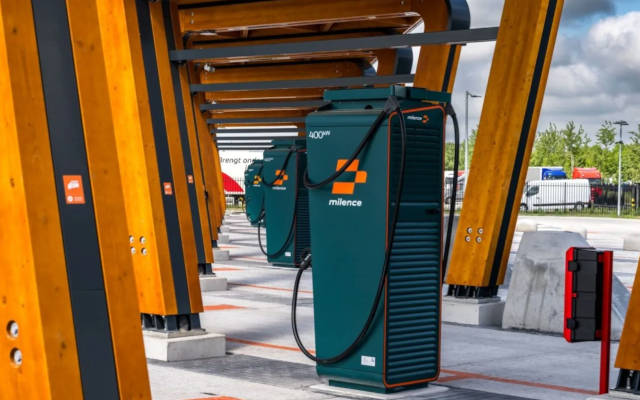 The Netherlands leans on its robust EV charging infrastructure rather than incentives alone: with 10.04 charge points per 1,000 people and over 157,000 outlets, it's Europe's densest network - even as the country ranks fourth in EV market share (~35%). Policymakers banned fossil-fuel vehicle sales by 2030 and are phasing down subsidies. Challenges now include rising charging costs - up 13% overall and 25% in Amsterdam.
The Netherlands leans on its robust EV charging infrastructure rather than incentives alone: with 10.04 charge points per 1,000 people and over 157,000 outlets, it's Europe's densest network - even as the country ranks fourth in EV market share (~35%). Policymakers banned fossil-fuel vehicle sales by 2030 and are phasing down subsidies. Challenges now include rising charging costs - up 13% overall and 25% in Amsterdam.
 EVWorld Exclusive
EVWorld Exclusive
Electric Icons in the Making: Audi Concept C vs. Chevrolet Corvette EV
23 Oct 2025 |  Audi's Concept C previews a refined electric GT built on the mature PPE platform, likely arriving by 2026. Chevrolet's Corvette EV promises supercar performance but faces packaging and thermal challenges. Audi is closer to production; Corvette remains in early development. Both reflect divergent strategies in electrifying legacy sports cars, with Audi emphasizing platform maturity and Chevrolet pursuing brand continuity through engineering innovation.
Audi's Concept C previews a refined electric GT built on the mature PPE platform, likely arriving by 2026. Chevrolet's Corvette EV promises supercar performance but faces packaging and thermal challenges. Audi is closer to production; Corvette remains in early development. Both reflect divergent strategies in electrifying legacy sports cars, with Audi emphasizing platform maturity and Chevrolet pursuing brand continuity through engineering innovation.
Electrification Is Not an Oversimplification
23 Oct 2025 |  Despite critiques that the quest for global electrification is "simplistic", the transition is strategic and necessary. Grid upgrades, battery innovation, and tailored policies make electrification viable. Sodium-ion batteries and recycling reduce material risk. Compared to fossil fuels, electrification offers cleaner, safer, and more resilient systems. Complexity demands better design - not delay.
Despite critiques that the quest for global electrification is "simplistic", the transition is strategic and necessary. Grid upgrades, battery innovation, and tailored policies make electrification viable. Sodium-ion batteries and recycling reduce material risk. Compared to fossil fuels, electrification offers cleaner, safer, and more resilient systems. Complexity demands better design - not delay.
What Is the Real Cost to Replace EV Tires?
23 Oct 2025 |  A recent BGR article overstates EV tire costs and ignores fuel savings, regenerative braking, and tire tech advances. Most EV drivers spend ~$2,100–$2,700 on tires over 100,000 miles - not $3,600. EVs save thousands in fuel and benefit from smoother wear profiles. Brands like Goodyear and Michelin now offer EV-specific tires with longer life and better efficiency. The article lacks context and deserves correction.
A recent BGR article overstates EV tire costs and ignores fuel savings, regenerative braking, and tire tech advances. Most EV drivers spend ~$2,100–$2,700 on tires over 100,000 miles - not $3,600. EVs save thousands in fuel and benefit from smoother wear profiles. Brands like Goodyear and Michelin now offer EV-specific tires with longer life and better efficiency. The article lacks context and deserves correction.
The Battery Divide: Strategic Choices in the Global Race to Electrify Mobility
23 Oct 2025 |  Toyota's "1 EV = 90 hybrids" logic reflects lithium scarcity, but sodium-ion batteries challenge that premise. Sodium offers low-cost, abundant chemistry for short-range EVs, decoupling electrification from lithium dependence. National policy shapes adoption: Europe favors full EVs, the U.S. subsidizes hybrids, and emerging markets seek pragmatic solutions. The battery divide is not just technical - it's strategic, reshaping the future of mobility.
Toyota's "1 EV = 90 hybrids" logic reflects lithium scarcity, but sodium-ion batteries challenge that premise. Sodium offers low-cost, abundant chemistry for short-range EVs, decoupling electrification from lithium dependence. National policy shapes adoption: Europe favors full EVs, the U.S. subsidizes hybrids, and emerging markets seek pragmatic solutions. The battery divide is not just technical - it's strategic, reshaping the future of mobility.
Irizar Expands Electric Bus Lineup with Global Reach and Long-Range Performance
22 Oct 2025 |  Irizar has launched two new electric buses - the ie bus and i3 Normal Floor - with over 450 km range, advanced safety systems, and modular lithium-ion batteries. The Spanish manufacturer has delivered over 1,000 electric buses globally since 2014. The new models are lighter, seat up to 53 passengers, and meet European safety and cybersecurity standards. With deployments in Europe, Latin America, and Oceania, Irizar is positioned as a global leader in zero-emission transit.
Irizar has launched two new electric buses - the ie bus and i3 Normal Floor - with over 450 km range, advanced safety systems, and modular lithium-ion batteries. The Spanish manufacturer has delivered over 1,000 electric buses globally since 2014. The new models are lighter, seat up to 53 passengers, and meet European safety and cybersecurity standards. With deployments in Europe, Latin America, and Oceania, Irizar is positioned as a global leader in zero-emission transit.
SEARCH RSSTREAM
 75 New Postings In Past 24 Hours
75 New Postings In Past 24 Hours
Category:mobility
Region:AsiaPacific
Date:23 Oct 2025
Category:mobility
Region:Europe
Date:23 Oct 2025
Category:mobility
Region:AsiaPacific
Date:23 Oct 2025
Category:mobility
Region:Europe
Date:23 Oct 2025
Category:mobility
Region:Europe
Date:23 Oct 2025
Category:energy
Region:NoAmerica
Date:23 Oct 2025
Category:finance
Region:NoAmerica
Date:23 Oct 2025
Category:energy
Region:AsiaPacific
Date:23 Oct 2025
Category:mobility
Region:Europe
Date:23 Oct 2025
Category:mobility
Region:NoAmerica
Date:23 Oct 2025
Category:mobility
Region:NoAmerica
Date:23 Oct 2025
Category:finance
Region:NoAmerica
Date:23 Oct 2025
Category:mobility
Region:NoAmerica
Date:23 Oct 2025
Category:policy
Region:NoAmerica
Date:23 Oct 2025
Category:mobility
Region:Europe
Date:23 Oct 2025
Category:mobility
Region:NoAmerica
Date:23 Oct 2025
Category:energy
Region:IndoAsia
Date:23 Oct 2025
Category:autonomy
Region:AsiaPacific
Date:23 Oct 2025
Category:mobility
Region:IndoAsia
Date:23 Oct 2025
Category:mobility
Region:NoAmerica
Date:23 Oct 2025
